By Leen Randell
Updated: Jul 04, 2024
10 Best Herbal Decoctions For Gout
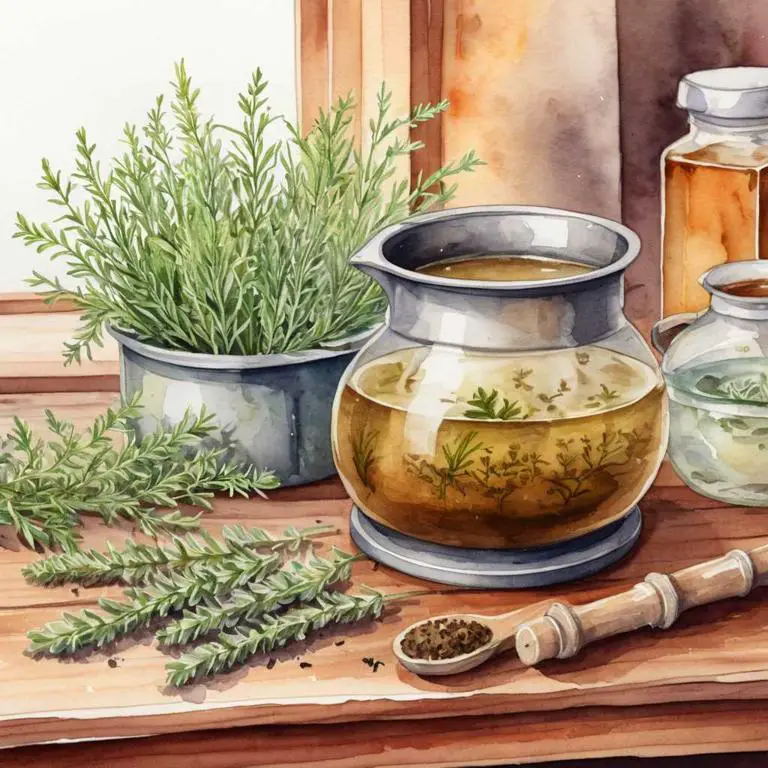
Herbal decoctions for gout are a natural remedy that involves boiling herbs in water to create a potent extract that can alleviate symptoms of gout.
These decoctions work by reducing inflammation, relieving pain and swelling, and improving kidney function, all of which help manage the condition. Examples include decoctions made from turmeric, ginger, and celery seed, which have anti-inflammatory properties that can quickly soothe joint pain and reduce morning stiffness.
By using these herbal decoctions, individuals with gout can enjoy improved mobility, reduced discomfort, and a better quality of life.
The following article describes in detail the most important decoctions for gout, including medicinal properties, parts of herbs to use, and recipes for preparations.
- 1. Berberis vulgaris
- 2. Curcuma longa
- 3. Boswellia serrata
- 4. Hydrastis canadensis
- 5. Taraxacum officinale
- 6. Salix alba
- 7. Urtica dioica
- 8. Silybum marianum
- 9. Ginkgo biloba
- 10. Glycyrrhiza glabra
- What is the best combination of herbal decoctions to use for gout?
- What ailments similar to gout are treated with herbal decoctions?
1. Berberis vulgaris
Barberry decoctions helps with gout because of its unique ability to reduce inflammation and alleviate symptoms.
Berberine, a key compound in barberry, has been shown to inhibit the production of uric acid, which can help reduce the severity of gout attacks. Additionally, berberine's anti-inflammatory properties can help soothe joint pain and stiffness associated with gout.
As a natural diuretic, barberry decoctions may also help flush out excess uric acid from the body, providing relief to individuals suffering from this debilitating condition.
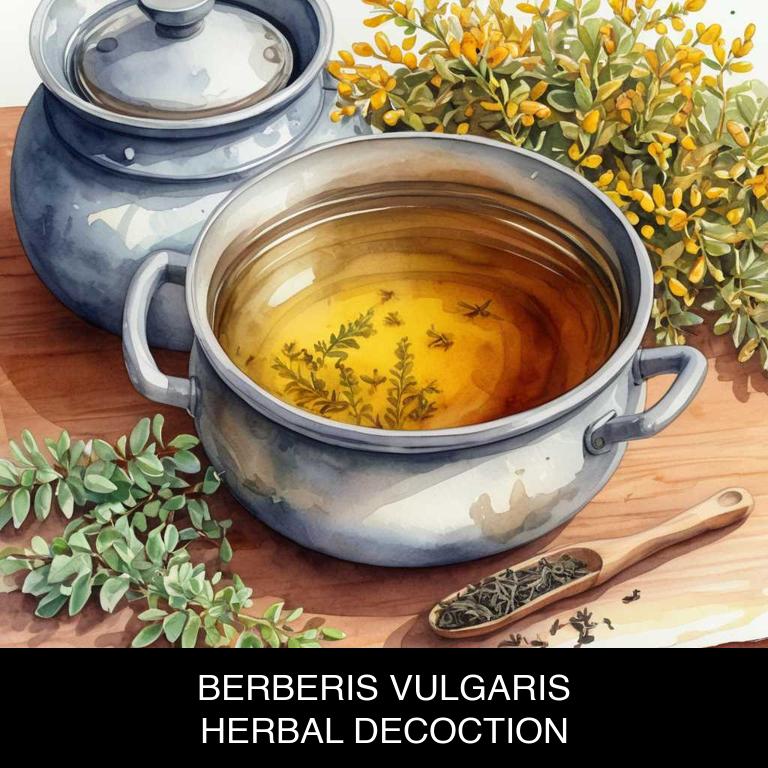
Medicinal Constituents
The list below shows the primary medicinal constituents in Berberis vulgaris decoctions that help with gout.
- Berberine: Helps reduce inflammation and alleviate gout symptoms by inhibiting the production of pro-inflammatory cytokines and reducing the activity of xanthine oxidase, an enzyme involved in uric acid production.
- Vitamin c: Contributes to the management of gout by increasing the excretion of uric acid in the urine, thus reducing its levels in the body and alleviating symptoms.
- Alkaloids: Exhibit anti-inflammatory and analgesic properties, which help to alleviate the pain and inflammation associated with gout attacks by inhibiting the production of pro-inflammatory mediators.
Parts Used
The list below shows the primary parts of barberry used to make decoctions for gout.
- Roots: They contain berberine, a compound that reduces inflammation and relieves pain associated with gout.
- Fruits: The fruits are rich in anthraquinones, which help reduce uric acid levels and alleviate gout symptoms.
- Barks: The bark contains berberine and other alkaloids that have anti-inflammatory and antioxidant properties, making it effective in treating gout.
Quick Recipe
The following recipe gives a procedure to make a basic barberry for gout.
- Harvest 1-2 pounds of berberis vulgaris roots and wash them thoroughly to remove any dirt.
- Chop the roots into small pieces and dry them in a warm place for 2-3 days.
- Combine 1 cup of chopped roots with 4 cups of water in a saucepan and bring to boil.
- Reduce heat to low and simmer the decoction for 30-45 minutes to release active compounds.
- Strain the decoction and discard the solids to obtain the final herbal liquid remedy.
2. Curcuma longa
Turmeric decoctions helps with gout because of its potent anti-inflammatory and antioxidant properties.
Curcumin, a key compound in turmeric, has been shown to reduce inflammation in joints, alleviating symptoms such as pain and swelling associated with gout. Additionally, curcumin inhibits the production of pro-inflammatory enzymes, which contribute to the development of gout.
As a result, consuming herbal turmeric decoctions may help alleviate gout attacks and reduce the frequency and severity of future episodes.
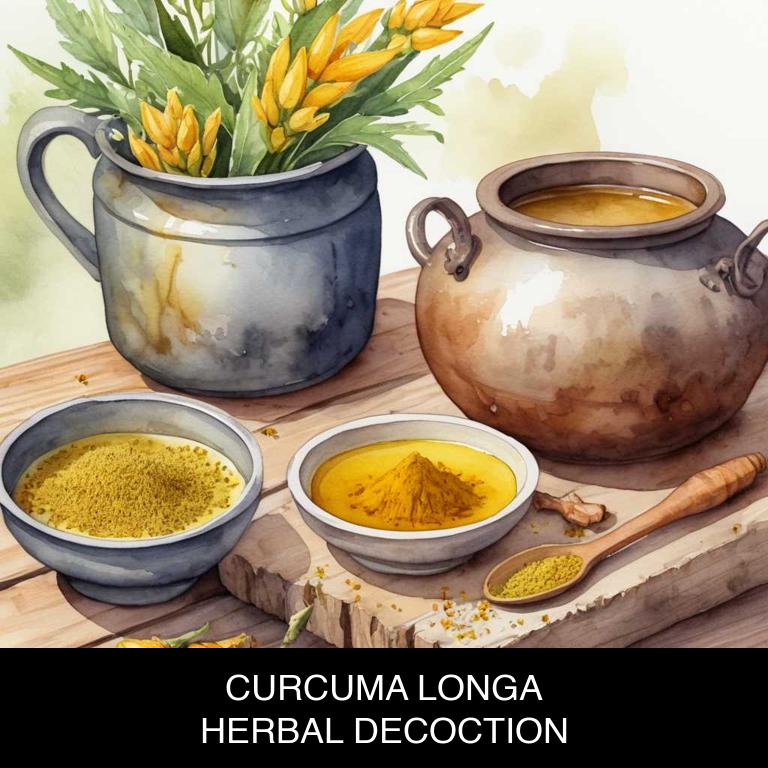
Medicinal Constituents
The list below shows the primary medicinal constituents in Curcuma longa decoctions that help with gout.
- Curcumin: Curcumin is a phenolic compound that helps with gout by reducing inflammation and oxidative stress, thereby alleviating pain and swelling associated with the condition.
- Demethoxycurcumin: Demethoxycurcumin is a curcuminoid that helps with gout by inhibiting the production of pro-inflammatory cytokines and enzymes, which contribute to the development of gout.
- Beta-curcumen: Beta-curcumen is a sesquiterpene that helps with gout by suppressing the activity of xanthine oxidase, an enzyme that converts hypoxanthine into uric acid, a key contributor to gout development.
Parts Used
The list below shows the primary parts of turmeric used to make decoctions for gout.
- Rhyzomes: Rhyzomes are the most commonly used part due to their high curcumin content, which has potent anti-inflammatory and antioxidant properties that help alleviate gout symptoms.
- Roots: Roots of Curcuma longa contain a significant amount of curcuminoids, which have been shown to reduce inflammation and oxidative stress associated with gout.
- Stems: Stems of Curcuma longa contain a smaller but still significant amount of curcuminoids, making them a viable alternative for decoctions, although less potent than rhyzomes or roots.
Quick Recipe
The following recipe gives a procedure to make a basic turmeric for gout.
- Harvest fresh curcuma longa rhizomes in the morning after the dew has evaporated and store them in a cool dry place.
- Peel 2-3 grams of the rhizomes per 250 milliliters of water using a vegetable peeler and discard the peel.
- Crush the peeled rhizomes into a fine paste using a mortar and pestle and add them to the water.
- Boil the mixture over high heat for 10-15 minutes then reduce the heat to a simmer for another 20-30 minutes.
- Strain the decoction through a cheesecloth or a fine-mesh sieve into a clean container and discard the solids.
3. Boswellia serrata
Frankincense decoctions helps with gout because of its potent anti-inflammatory properties.
The decoction's active compounds, such as boswellic acids, work to reduce inflammation in the joints, alleviating symptoms like pain, stiffness, and swelling associated with gout attacks. Additionally, frankincense has natural antioxidant and immunomodulatory effects, which can help modulate the immune response and prevent future episodes of gout flares.
By targeting multiple pathways simultaneously, frankincense decoctions offer a holistic approach to managing gout symptoms and improving overall joint health.
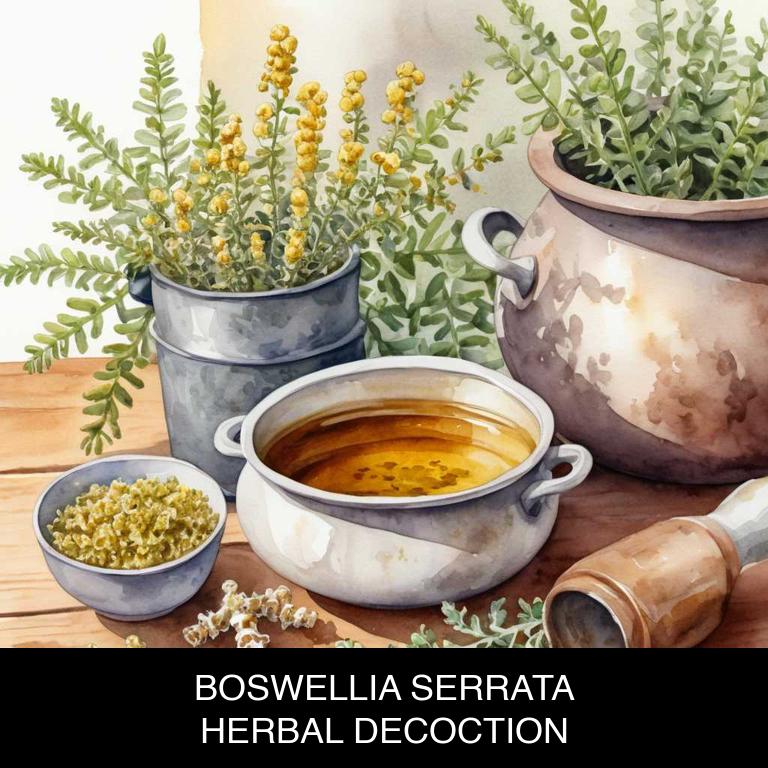
Medicinal Constituents
The list below shows the primary medicinal constituents in Boswellia serrata decoctions that help with gout.
- Alpha-boswellic acid: ABA helps reduce inflammation and pain in gout by inhibiting the production of pro-inflammatory enzymes such as COX-2.
- Boswellic acids: Boswellic acids, particularly ABA, have anti-inflammatory properties that help reduce swelling and pain associated with gout.
- 3-acetyl-11-keto-β-boswellic acid: AKBA is known to inhibit the production of pro-inflammatory cytokines and enzymes, which helps reduce inflammation and alleviate symptoms of gout.
Parts Used
The list below shows the primary parts of frankincense used to make decoctions for gout.
- Roots: They are the primary source of boswellic acids, which are known for their anti-inflammatory properties and potential in managing gout symptoms.
- Rhyzomes: Similar to roots, rhyzomes of Boswellia serrata are also a rich source of boswellic acids, contributing to their use in gout decoctions.
- Barks: The barks of the tree are another part used for decoctions due to their high content of boswellic acids, which help to reduce inflammation associated with gout.
Quick Recipe
The following recipe gives a procedure to make a basic frankincense for gout.
- Gather 2-4 grams of dried boswellia serrata resin and 1 liter of water for decoction preparation.
- Combine the resin with water in a saucepan and bring to a boil over medium heat.
- Reduce heat to low and simmer the mixture for 10-15 minutes.
- Strain the decoction through a cheesecloth or a fine-mesh sieve into a cup.
- Discard the solids and let the decoction cool to room temperature before serving.
4. Hydrastis canadensis
Goldenseal decoctions helps with gout because it contains berberine, a natural compound that has potent anti-inflammatory properties.
Berberine works by inhibiting the production of inflammatory chemicals in the body, thereby reducing swelling and pain associated with gout attacks. Additionally, goldenseal's antioxidant properties help to protect joints from damage caused by free radicals, which can exacerbate gout symptoms.
By consuming goldenseal decoctions regularly, individuals may experience relief from gout-related discomfort and reduce the frequency of future attacks.
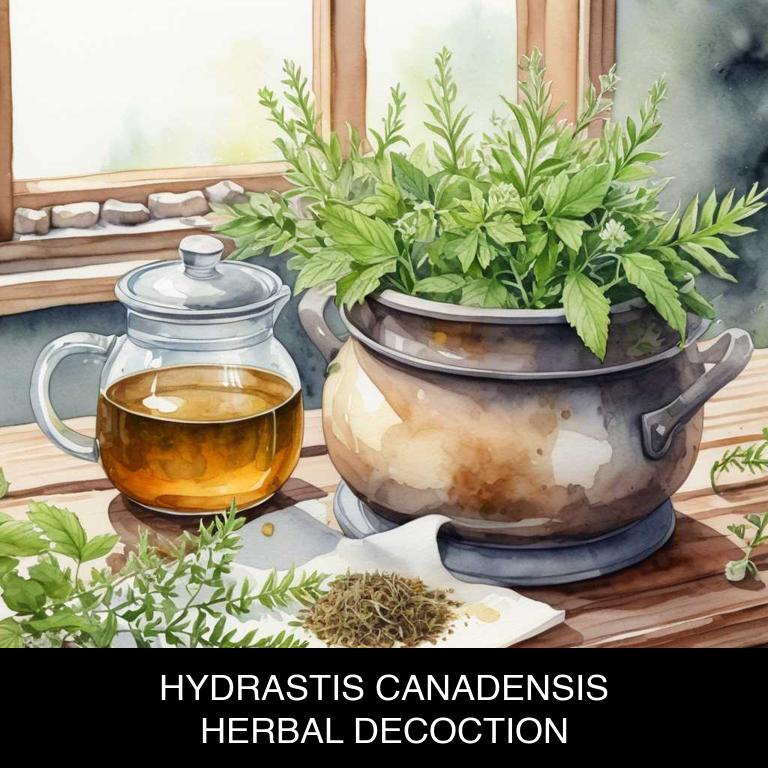
Medicinal Constituents
The list below shows the primary medicinal constituents in Hydrastis canadensis decoctions that help with gout.
- Alkaloids: Berberine has anti-inflammatory and antioxidant properties, which help reduce the inflammation and oxidative stress associated with gout.
- Phenolic acids: Gallic acid has potent antioxidant and anti-inflammatory effects, which may help reduce uric acid levels and alleviate gout symptoms.
- Tannins: Tannins in Hydrastis canadensis have been shown to have anti-inflammatory and antiseptic properties, which may help reduce the severity of gout attacks and promote overall kidney health.
Parts Used
The list below shows the primary parts of goldenseal used to make decoctions for gout.
- Roots: The roots are the most commonly used part due to their high content of berberine, a compound that has anti-inflammatory and analgesic properties.
- Barks: The barks are also used, as they contain berberine and other alkaloids that help to reduce pain and inflammation associated with gout.
- Leaves: The leaves are used in decoctions to leverage their berberine content, which helps to alleviate symptoms of gout, including joint pain and swelling.
Quick Recipe
The following recipe gives a procedure to make a basic goldenseal for gout.
- Harvest a sufficient quantity of dried hydrastis canadensis roots approximately 30-60 grams.
- Rinse the dried roots thoroughly with clean water to remove any impurities.
- Combine the dried roots with 8-10 cups of water in a medium-sized saucepan.
- Bring the mixture to a boil then reduce heat and simmer for 10-15 minutes.
- Strain the liquid mixture through a cheesecloth or a fine-mesh sieve into a container.
5. Taraxacum officinale
Dandelion decoctions helps with gout because of its unique composition.
The herb contains taraxasterol, a compound that has been shown to reduce inflammation and alleviate pain associated with gout attacks. Additionally, dandelion roots contain antioxidants and polyphenols that help to neutralize uric acid buildup in the body, which is a common cause of gout flares.
By promoting healthy kidney function and eliminating excess uric acid, dandelion decoctions can provide natural relief from gout symptoms, making it a popular herbal remedy for those seeking alternative treatment options.

Medicinal Constituents
The list below shows the primary medicinal constituents in Taraxacum officinale decoctions that help with gout.
- Taraxasterol: This triterpenoid saponin may help with gout by reducing inflammation and modulating the immune response, which can contribute to gout symptoms.
- Luteolin: This flavonoid may help with gout by inhibiting the production of pro-inflammatory cytokines and enzymes that contribute to joint inflammation and damage.
- Quercetin: This flavonoid may help with gout by reducing inflammation, suppressing the production of uric acid, and inhibiting the activity of xanthine oxidase, an enzyme involved in uric acid production.
Parts Used
The list below shows the primary parts of dandelion used to make decoctions for gout.
- Roots: Rich in taraxasterol and other saponins, which help reduce inflammation and alleviate gout symptoms.
- Leaves: Contain flavonoids and other compounds that help inhibit the production of uric acid, a primary cause of gout.
- Stems: Contain phenolic acids and other bioactive compounds that aid in reducing inflammation and pain associated with gout.
Quick Recipe
The following recipe gives a procedure to make a basic dandelion for gout.
- Harvest 5-10 fresh taraxacum officinale leaves and flowers, ideally in the early morning or just before sunrise.
- Rinse the taraxacum officinale leaves and flowers with cold water to remove any dirt or debris.
- Combine 1 teaspoon of the fresh taraxacum officinale leaves and flowers with 1 cup of boiling water in a saucepan.
- Reduce the heat to a simmer for 10-15 minutes, allowing the taraxacum officinale to infuse into the water.
- Strain the decoction through a cheesecloth or a fine-mesh sieve into a clean container, discarding the solids.
6. Salix alba
White willow decoctions helps with gout because they contain salicin, a natural anti-inflammatory compound that mimics the effects of aspirin.
Salicin helps to reduce inflammation and alleviate pain associated with gout attacks, making it an effective remedy for relieving symptoms. By reducing swelling and discomfort, white willow decoctions provide quick relief from gout's debilitating effects, allowing individuals to return to their normal daily activities sooner.
The anti-inflammatory properties of salicin also help to prevent future gout attacks by reducing uric acid levels in the body.
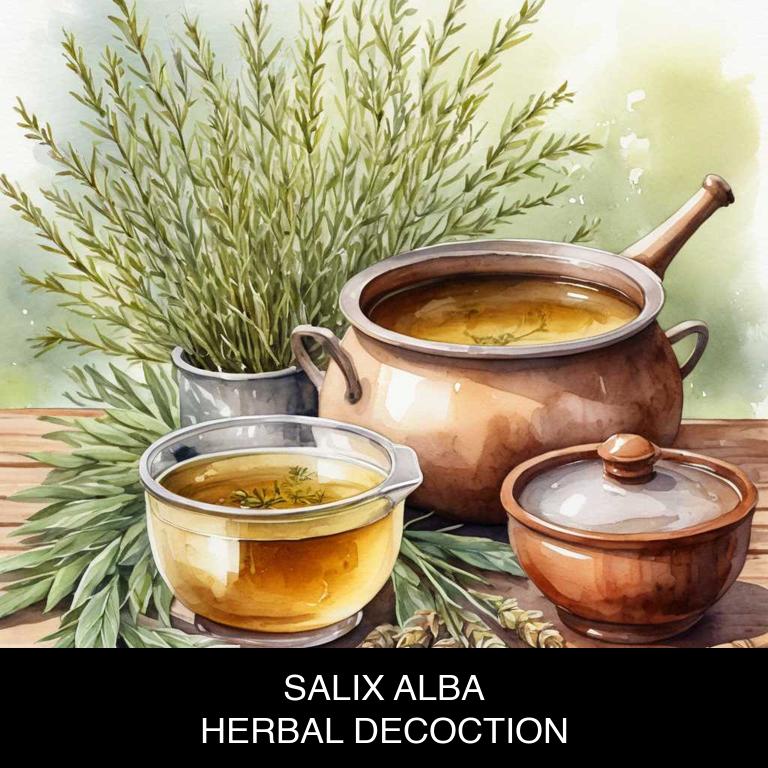
Medicinal Constituents
The list below shows the primary medicinal constituents in Salix alba decoctions that help with gout.
- Salicylic acid: Salicylic acid has anti-inflammatory properties, which help reduce inflammation and pain associated with gout.
- Salicin: Salicin is converted into salicylic acid in the body and has potent anti-inflammatory and analgesic effects, which help alleviate gout symptoms.
- Flavonoids: Flavonoids in Salix alba decoctions have antioxidant and anti-inflammatory properties, which help reduce oxidative stress and inflammation in gouty joints.
Parts Used
The list below shows the primary parts of white willow used to make decoctions for gout.
- Leaves: The leaves are used for their diuretic and anti-inflammatory properties, which aid in reducing inflammation and fluid retention associated with gout.
- Roots: The roots are utilized due to their ability to reduce inflammation and alleviate pain, making them a useful treatment for gout symptoms.
Quick Recipe
The following recipe gives a procedure to make a basic white willow for gout.
- Harvest 1-2 pounds of fresh salix alba bark or 1/2 pound dried bark.
- Clean the harvested material by removing any dirt or debris with a soft brush.
- Chop the cleaned salix alba bark into small pieces to increase the surface area for infusion.
- Combine 1-2 teaspoons of chopped bark with 1 quart of boiling water to make the decoction.
- Simmer the mixture for 10-15 minutes to extract the medicinal properties from the salix alba bark.
7. Urtica dioica
Stinging nettle decoctions helps with gout because of its anti-inflammatory properties, which help reduce swelling and pain associated with this condition.
The decoction's uric acid-reducing effects also contribute to its ability to alleviate symptoms. Additionally, stinging nettle contains antioxidants that help protect the joints from further damage caused by free radicals.
By reducing inflammation and promoting healthy joint function, stinging nettle decoctions offer a natural and effective solution for managing gout-related discomfort.
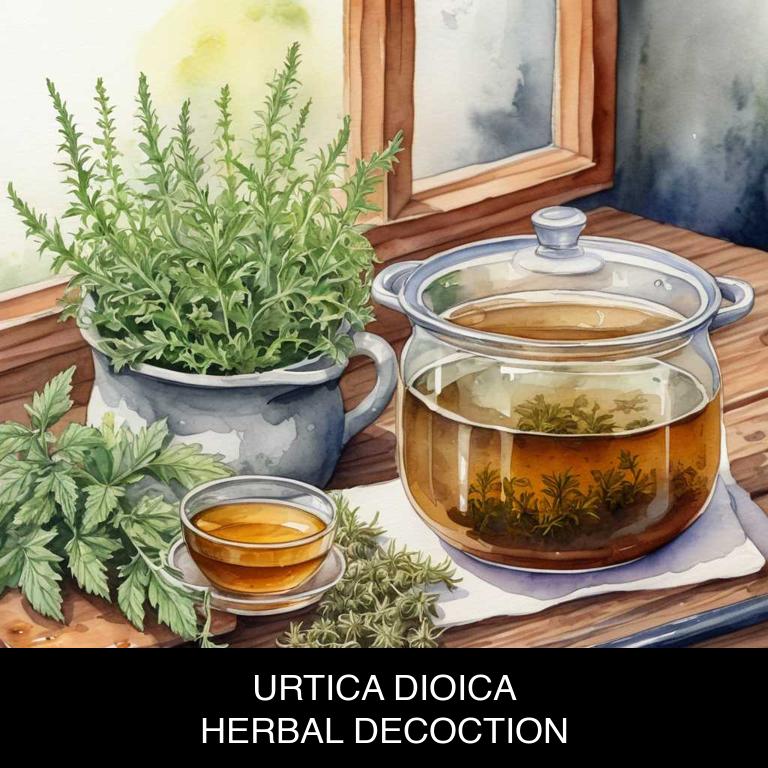
Medicinal Constituents
The list below shows the primary medicinal constituents in Urtica dioica decoctions that help with gout.
- Iridoid glycosides: These compounds help reduce inflammation and ease pain associated with gout by inhibiting the production of pro-inflammatory cytokines and enzymes.
- Phenolic acids: They help alleviate gout symptoms by scavenging free radicals, reducing oxidative stress, and inhibiting the activity of uric acid-producing enzymes.
- Polysaccharides: These complex sugars help alleviate gout symptoms by modulating the immune system, reducing inflammation, and improving the body's ability to remove uric acid waste products.
Parts Used
The list below shows the primary parts of stinging nettle used to make decoctions for gout.
- Leaves: Rich in urticine and other compounds that help reduce inflammation and pain associated with gout.
- Roots: Contain saponins and other bioactive compounds that may help reduce inflammation and alleviate gout symptoms.
- Stems: Used in decoctions due to their high content of flavonoids and other compounds that have anti-inflammatory and antioxidant properties.
Quick Recipe
The following recipe gives a procedure to make a basic stinging nettle for gout.
- Harvest 1/4 cup of fresh urtica dioica leaves and stems or 2 tablespoons of dried plant material.
- Chop the urtica dioica material into small pieces to release its active compounds and oils.
- Combine the chopped urtica dioica with 2 cups of water in a saucepan and bring to a boil.
- Reduce heat and simmer the decoction for 5-10 minutes to allow for extraction of nutrients.
- Strain the decoction using a fine-mesh sieve or cheesecloth and discard the solids.
8. Silybum marianum
Milk thistle decoctions helps with gout because of its potent anti-inflammatory properties, which help reduce joint pain and swelling.
The decoction's silymarin compound also has antioxidant effects, protecting the kidneys from damage caused by uric acid buildup, a common contributor to gout attacks. Additionally, milk thistle may help lower uric acid levels in the blood, reducing the frequency and severity of gout flares.
By addressing both inflammation and underlying metabolic issues, herbal milk thistle decoctions offer a natural solution for managing gout symptoms.
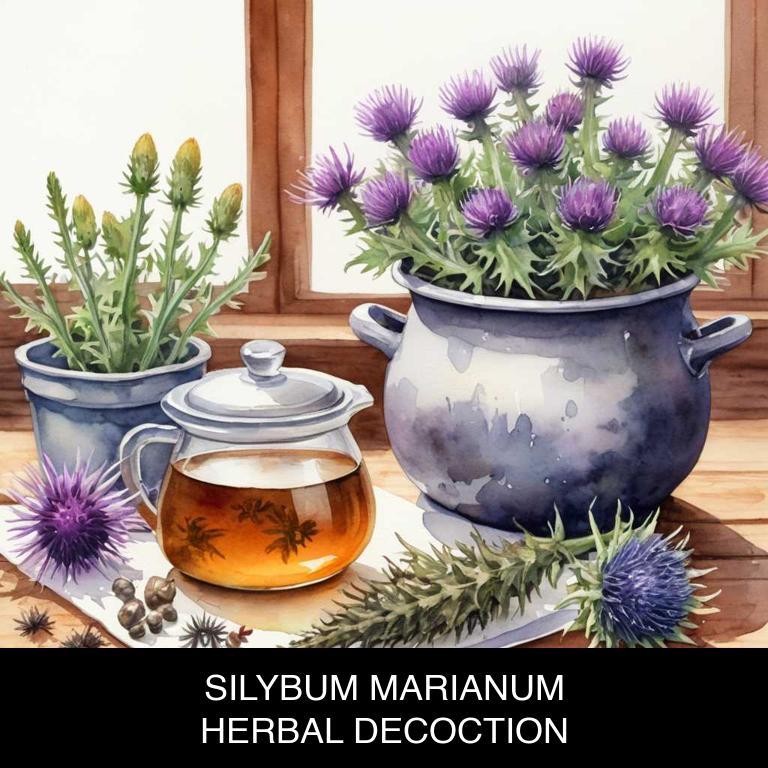
Medicinal Constituents
The list below shows the primary medicinal constituents in Silybum marianum decoctions that help with gout.
- Silymarin: A complex mixture of flavonoids and phenolic acids, silymarin helps reduce inflammation and oxidative stress associated with gout, thus alleviating symptoms and preventing joint damage.
- Lignans: A type of phenolic compound, lignans in Silybum marianum decoctions exhibit anti-inflammatory and antioxidant properties, which help mitigate the severity of gout attacks and reduce the risk of kidney stones.
- Flavonoids: These polyphenolic compounds have potent anti-inflammatory and antioxidant effects, helping to reduce uric acid levels, alleviate pain and swelling associated with gout, and prevent further joint damage.
Parts Used
The list below shows the primary parts of milk thistle used to make decoctions for gout.
- Seeds: Silybum marianum seeds are commonly used to make decoctions for gout due to their high content of silymarin, which has anti-inflammatory properties.
- Leaves: Silybum marianum leaves are used in decoctions for gout due to their ability to reduce inflammation and alleviate pain associated with the condition.
- Roots: Silybum marianum roots are used to make decoctions for gout due to their rich content of flavonoids and saponins, which have anti-inflammatory and antioxidant properties that help alleviate gout symptoms.
Quick Recipe
The following recipe gives a procedure to make a basic milk thistle for gout.
- Gather 30-60 grams of dried silybum marianum flowers and leaves for decoction preparation.
- Combine the gathered silybum marianum material with 1 liter of water in a large pot.
- Boil the water and silybum marianum mixture for 5-10 minutes over high heat.
- Reduce heat to low and simmer the mixture for an additional 15-20 minutes.
- Strain the decoction through a cheesecloth or fine-mesh sieve into a container for storage.
9. Ginkgo biloba
Maidenhair tree decoctions helps with gout because it possesses anti-inflammatory properties that effectively reduce swelling and pain associated with the condition.
The decoction also exhibits diuretic properties, which help to flush out excess uric acid from the body, thereby reducing its concentration in the blood and alleviating symptoms of gout such as joint inflammation and stiffness.
Additionally, maidenhair tree has been traditionally used to treat rheumatism and arthritis, conditions that often co-occur with gout.
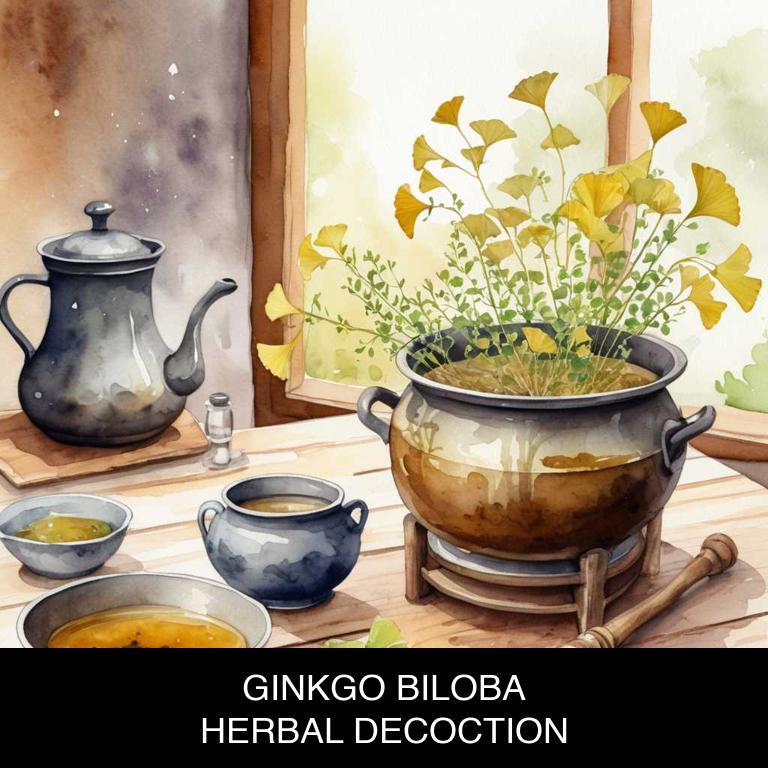
Medicinal Constituents
The list below shows the primary medicinal constituents in Ginkgo biloba decoctions that help with gout.
- Bilobalide: It helps reduce inflammation and oxidative stress in gout by inhibiting the production of pro-inflammatory cytokines and free radicals.
- Flavonoids: They act as potent anti-inflammatory agents, scavenging free radicals, and inhibiting the activity of enzymes involved in the production of uric acid, thus helping alleviate gout symptoms.
- Ginkgolides: They possess anti-inflammatory properties, which help reduce the severity of gout by inhibiting the activity of pro-inflammatory mediators and reducing the production of uric acid in the body.
Parts Used
The list below shows the primary parts of maidenhair tree used to make decoctions for gout.
- Leaves: The leaves are the primary part used due to their bioactive compounds, including flavonoids and terpenoids, which have anti-inflammatory and antioxidant properties that help alleviate gout symptoms.
- Buds: The buds are used as they contain flavonoids and terpenoids that may help reduce inflammation and pain associated with gout.
- Roots: The roots are also used as they contain bioactive compounds, including ginkgolides and bilobalide, which have anti-inflammatory and antioxidant properties that can help manage gout symptoms.
Quick Recipe
The following recipe gives a procedure to make a basic maidenhair tree for gout.
- Choose high-quality fresh or dried ginkgo biloba leaves with a minimum of 24% flavonoid content.
- Measure out 2-3 grams of the dried leaves or 10-15 grams of fresh leaves for every 250ml of water.
- Boil the water in a saucepan and then add the measured ginkgo biloba leaves.
- Reduce the heat to a simmer and let the decoction steep for 15-30 minutes or until the liquid has reduced slightly.
- Strain the decoction through a cheesecloth or a fine-mesh sieve into a clean container and discard the solids.
10. Glycyrrhiza glabra
Licorice decoctions helps with gout because they contain glycyrrhizin, a compound that has anti-inflammatory properties.
This compound works by inhibiting the production of pro-inflammatory cytokines, which are released during gout attacks and contribute to inflammation and pain.
Additionally, licorice root has been shown to reduce the activity of enzymes involved in uric acid production, thereby decreasing the amount of uric acid in the blood that can cause gout symptoms.

Medicinal Constituents
The list below shows the primary medicinal constituents in Glycyrrhiza glabra decoctions that help with gout.
- Saponins: Saponins help with gout by reducing inflammation and inhibiting the production of pro-inflammatory cytokines, thereby alleviating symptoms of the condition.
- Glycyrrhizin: Glycyrrhizin helps with gout by inhibiting the activity of 11-beta-hydroxysteroid dehydrogenase, an enzyme involved in the regulation of cortisol levels, which in turn reduces the formation of uric acid in the body.
- Flavonoids: Flavonoids help with gout by exerting anti-inflammatory and antioxidant effects, which reduce oxidative stress and inflammation associated with gout.
Parts Used
The list below shows the primary parts of licorice used to make decoctions for gout.
- Roots: Roots: The primary part used, as they contain the highest concentration of glycyrrhizin, a compound responsible for its therapeutic effects.
- Roots: This part is used due to its anti-inflammatory properties, which help alleviate the pain and swelling associated with gout.
- Roots: The roots are also used to help reduce uric acid levels in the blood, a key factor in the development of gout.
Quick Recipe
The following recipe gives a procedure to make a basic licorice for gout.
- Harvest fresh or dried roots of the plant with a yield of 10-30 grams per serving.
- Rinse the harvested roots under cold water to remove impurities and debris.
- Cut the roots into small pieces and boil them in 1 liter of water for 5-10 minutes.
- Strain the liquid mixture through a cheesecloth or a fine-mesh sieve to separate the roots.
- Store the decoction in airtight containers in the refrigerator for up to 24 hours.
What is the best combination of herbal decoctions to use for gout?
The best combination of herbal decoctions that help with gout is a blend of turmeric, ginger, and celery seed decoctions.
Turmeric contains curcumin, which reduces inflammation and pain, while ginger alleviates nausea and discomfort. Celery seed decoction is rich in apigenin, an anti-inflammatory compound that helps dissolve uric acid crystals. By combining these decoctions, individuals can experience relief from gout symptoms, such as joint pain and swelling.
Regular consumption of this blend may also help prevent future gout attacks.
What ailments similar to gout are treated with herbal decoctions?
Ailments similar to gout/decoctions.html">gout/decoctions.html">gout that are treated with herbal decoctions are conditions characterized by inflammation and joint pain, such as rheumatoid arthritis, osteoarthritis, and pseudogout.
Herbal decoctions containing herbs like turmeric, ginger, and willow bark have anti-inflammatory properties that help reduce swelling and alleviate symptoms.
These natural remedies can also be used to manage fibromyalgia, tendinitis, and bursitis, promoting relaxation and reducing pain.